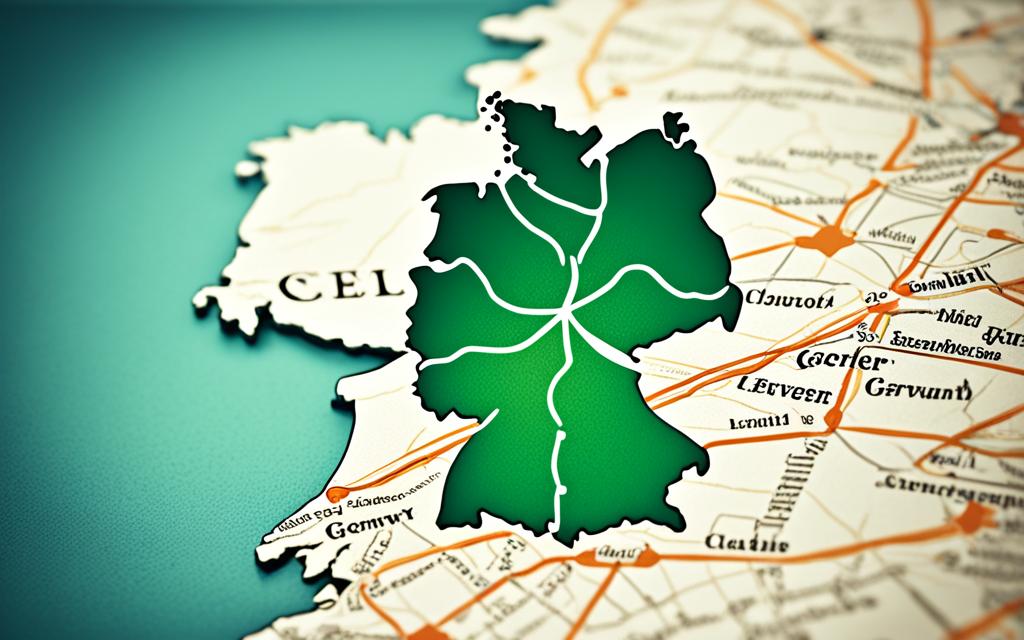Welcome to our guide on expanding your business to Germany! If you’re considering business expansion and want to tap into the lucrative German market, you’ve come to the right place. Germany offers great opportunities for growth and success, and we’re here to help you navigate the path to success.
Expanding your business to a new country can be a daunting task, but with the right strategies and insights, it becomes a rewarding endeavor. In this article, we will provide you with valuable tips and steps to ensure a smooth transition into the German market.
German market holds immense potential for businesses across various industries. With a strong economy, high consumer spending power, and a stable business environment, Germany offers a fertile ground for business expansion. Whether you want to introduce your products or services to a new customer base or tap into the vibrant German business ecosystem, we’ll guide you every step of the way.
Throughout this guide, we’ll cover essential topics such as understanding the German market, conducting market research, developing a market entry strategy, establishing a presence in Germany, building a strong local network, marketing and promoting your business, and implementing growth strategies.
By the end of this guide, you’ll have the knowledge and confidence to expand your business to Germany successfully. Let’s get started on this exciting journey together!
Understanding the German Market
Before expanding to Germany, it is crucial to gain a comprehensive understanding of the German market. So, let’s dive deeper into the current business landscape, emerging trends, and potential opportunities for your business.
The German market is known for its strong economy and global influence. With a population of over 82 million people and a high GDP, Germany offers immense business opportunities.
Germany is one of the largest economies in the world and is home to various industries, including automotive, technology, engineering, healthcare, and more. Its central location in Europe and well-developed infrastructure make it an attractive destination for businesses looking to expand.
When considering the German market, it’s essential to analyze the current business landscape. Familiarize yourself with the competition, market trends, and consumer preferences. This research will help you identify gaps or untapped niches where your business can thrive.
Emerging Trends in the German Market
As the German market evolves, it is essential to keep up with emerging trends and adapt your business strategies accordingly. Here are a few trends to consider:
- Digitalization: Germany is embracing digital transformation, opening up opportunities in e-commerce, digital services, and innovative technologies.
- Sustainability: The demand for sustainable products and services is growing in Germany. Consumers are increasingly conscious of their environmental impact.
- Health and Wellness: There is a rising interest in health and wellness in Germany, presenting opportunities in areas such as organic food, fitness, and wellness tourism.
- Smart Cities: Germany is investing in smart city initiatives, creating avenues for businesses focusing on urban development and technology integration.
By staying updated with these trends and understanding their impact on the German market, you can tailor your business offerings to meet the evolving needs of local consumers.
In the next section, we will delve into the importance of conducting thorough market research before expanding to Germany. It is crucial to identify your specific target audience and evaluate market demand to ensure a successful entry into the German market.
Conducting Market Research
Prior to expanding your business to Germany, it is vital to conduct thorough market research. This process will help you identify your target audience in Germany, analyze the competition, and evaluate market demand.
Identifying Your Target Audience in Germany
Understanding your target audience is the first step in market research. You need to identify the specific demographics, interests, and behaviors of your potential customers in Germany. By gathering this valuable information, you can tailor your marketing efforts to effectively reach and engage your target audience.
Analyzing the Competition
Analyze your competitors in the German market to gain insights and identify opportunities. Look at their products, pricing strategies, marketing campaigns, and customer reviews. By understanding your competitors’ strengths and weaknesses, you can position your business uniquely and gain a competitive advantage.
Evaluating Market Demand
Assessing the market demand in Germany is crucial for determining the potential success of your business. Study market trends, consumer behaviors, and purchasing patterns. Identify any gaps or unmet needs in the market that your products or services can fulfill. This knowledge will help you develop a compelling value proposition that resonates with the German audience.
By conducting comprehensive market research, you can make informed decisions and develop effective strategies for expanding your business to Germany. This investment of time and effort will lay a solid foundation for your success in the German market.
Developing a Market Entry Strategy
A well-defined market entry strategy is crucial for successfully expanding your business into the German market. To ensure a smooth entry and maximize your chances of success, it’s important to consider key factors such as legal requirements, business structures, and potential partnerships.
One of the first steps in developing your market entry strategy is understanding the legal requirements for operating in Germany. Familiarize yourself with the necessary permits, licenses, and regulations specific to your industry. Compliance with these guidelines is essential and will help you avoid unnecessary legal issues down the line.
When entering the German market, it’s important to evaluate and choose the most suitable business structure. Consider the various options available such as setting up a subsidiary, establishing a branch office, or partnering with a local distributor. Each option has its own advantages and implications in terms of liability, taxation, and operational control.
Another key element of your market entry strategy is identifying potential partnerships in Germany. Collaborating with local businesses or distributors can provide valuable insights into the German market, enhance your distribution network, and help navigate cultural nuances. Partnering with established players can also facilitate market entry by leveraging their existing customer base and resources.
Developing a comprehensive market entry strategy requires careful analysis, research, and planning. Taking the time to evaluate legal requirements, explore business structure options, and seek out potential partnerships will significantly increase your chances of success when entering the German market.
Next, let’s explore how to establish a presence in Germany and navigate the process of business incorporation in the country.
Establishing a Presence in Germany
Setting up a company in Germany requires careful planning and adherence to local regulations. It is essential to navigate the process of business incorporation effectively to ensure a smooth entry into the German market.
When establishing your presence in Germany, you will need to consider various factors such as paperwork, licensing, and tax considerations. We have compiled a comprehensive guide to help you through the steps of business incorporation, ensuring you meet all the necessary requirements.
1. Paperwork and Legal Requirements
First and foremost, you will need to gather the necessary documents to legally establish your company in Germany. This may include identification documents, proof of business address, and any applicable permits or certifications.
It’s important to consult with local authorities or legal professionals to ensure you have all the required paperwork in order. By adhering to the legal requirements, you can avoid any complications or delays during the incorporation process.
2. Choosing a Business Structure
When setting up your company in Germany, it’s crucial to select the appropriate business structure that aligns with your goals and needs. Common options include sole proprietorships, partnerships, limited liability companies (GmbH), and stock corporations (AG).
Consider seeking advice from a business consultant or legal expert to determine the most suitable business structure for your specific situation. They can guide you through the advantages, disadvantages, and legal implications of each option.
3. Obtaining the Necessary Licenses and Permits
Depending on the nature of your business, you may need to obtain specific licenses and permits to operate legally in Germany. These requirements vary across different industries and can include trade licenses, environmental permits, or certifications for regulated professions.
Research the relevant licensing authorities and understand the specific requirements for your industry. Failing to comply with these regulations can result in penalties or even legal consequences, which can significantly impact your business operations.
4. Tax Considerations
Understanding the tax obligations in Germany is important for a smooth business incorporation process. Familiarize yourself with the local tax system, including corporate income tax, value-added tax (VAT), and employment taxes.
Consider consulting with a tax advisor who specializes in international taxation to ensure compliance with German tax laws. They can help you navigate the complexities of tax regulations and develop a sustainable tax strategy for your business.
By following these steps and considering these vital aspects, you can successfully establish a presence in Germany and position your company for growth in the exciting German market.
Building a Strong Local Network
Building strong relationships and partnerships in the German business community is essential for long-term success. By establishing local partnerships, you can tap into the knowledge, expertise, and networks of established German businesses, gaining valuable insights and opening doors to new opportunities.
To effectively network in Germany, consider the following tips:
- Attend industry events: Participate in trade shows, conferences, and seminars relevant to your industry. These events provide excellent opportunities to connect with like-minded professionals and potential partners in your target market.
- Join industry associations: Becoming a member of industry associations can help you gain credibility and visibility within your sector. Attend association meetings and networking events to engage with key players and stay updated on industry trends.
- Engage with potential customers: Actively seek out potential customers and clients by attending business networking events or hosting your own events. Be prepared with a compelling elevator pitch and focus on building relationships rather than immediate sales.
- Utilize online platforms: Leverage social media platforms, such as LinkedIn, Xing (popular in Germany), and industry-specific forums to connect with professionals in your field. Engage in discussions, share valuable content, and build connections with potential partners and customers.
Remember, networking is about building mutually beneficial relationships, so always aim to provide value to your connections. Share industry insights, offer assistance, and actively listen to the needs of others. By nurturing your network and fostering meaningful connections, you can create a solid foundation for your business in Germany.
Marketing and Promoting Your Business in Germany
Introducing your business to the German market requires a well-thought-out marketing and promotion strategy. To effectively reach your target audience in Germany, a tailored approach that considers cultural aspects and utilizes various marketing channels is essential.
Understanding the German Consumer
Before diving into marketing strategies, it’s crucial to have a thorough understanding of the German consumer. Germans appreciate high-quality products, value reliability, and prioritize long-term relationships with businesses. Keep these preferences in mind when crafting your marketing messages.
Market Research for Effective Targeting
Conducting market research will empower you to identify your target audience in Germany and tailor your promotional efforts accordingly. It’s crucial to understand their needs, preferences, and how they interact with different marketing channels. Research will help you optimize your promotional strategies with precision.
Leveraging Online Marketing Channels
In today’s digital age, online marketing offers numerous opportunities to reach German consumers. Through search engine optimization (SEO), content marketing, and targeted digital advertising, you can effectively position your business online and increase your visibility to potential customers.
To further enhance your online presence, consider utilizing social media platforms popular among Germans, such as Facebook, Instagram, and LinkedIn. Engage with your audience, share relevant content, and create a strong online brand presence to build trust and credibility.
Offline Marketing Strategies
While online marketing is crucial, offline strategies should not be neglected. Participating in trade shows, industry conferences, and local events allows you to connect with potential customers, partners, and industry influencers. Additionally, distributing printed materials, such as brochures or flyers, can effectively raise awareness of your business.
Effective Content Marketing
Create engaging and valuable content that speaks directly to your target audience. This could include blog articles, videos, or infographics that provide valuable insights or solutions to their problems. By establishing yourself as an expert in your industry, you can attract and retain customers while building brand loyalty.
Cultural Considerations for Marketing
When promoting your business in Germany, understanding and respecting cultural nuances is vital. Adapt your marketing messages, visuals, and tone to align with German cultural norms and values. This will help you resonate with the local audience and build trust with potential customers.
Remember, effective marketing and promotion strategies in Germany require a holistic approach that combines online and offline efforts. By crafting a targeted marketing strategy, leveraging digital channels, and respecting cultural differences, you’ll be well on your way to successfully promoting your business in Germany.
Implementing Growth Strategies
Once your business is established in Germany, it’s time to shift your focus towards sustainable growth. Expanding operations and scaling your business in a new market requires careful planning and strategic execution.
Firstly, consider diversifying your product or service offerings to appeal to a wider customer base. Conduct market research to identify untapped opportunities and develop tailored solutions that meet the needs of the German market. By continuously innovating and adapting, you can position your business for long-term success.
In addition, building strong relationships with local partners and suppliers is essential. Collaborating with German companies can provide valuable insights and connections within the market, enabling you to expand your reach and increase your customer base. Networking events and industry associations can be valuable resources for making these connections.
Lastly, investing in digital marketing and e-commerce can significantly boost your business growth in Germany. Leverage social media platforms, search engine optimization (SEO), and online advertising to increase brand visibility and attract new customers. Consider localizing your marketing content to resonate with the German audience and enhance your online presence.

















